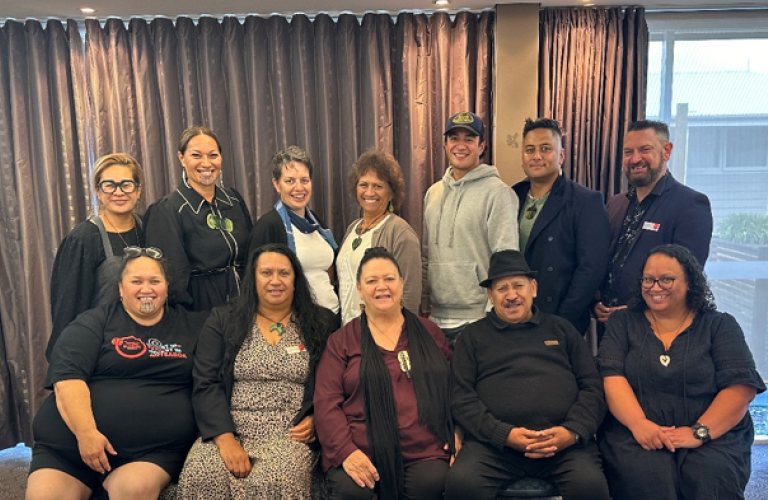Karanga and whaikōrero succession planning at PPTA Te Wehengarua

Background
Succession planning and investment is crucial to ensure the calibre of PPTA Te Wehengarua cultural practices and the level of whaikōrero and karanga reputation of PPTA Te Wehengarua leadership in the cultural space remains strong. This will provide assurance that tikanga Māori practices at PPTA Te Wehengarua conferences are performed well today, and in the future.
Providing these supports demonstrates organisation support and appreciation for our upcoming members who have stepped forward to upskill in cultural spaces that are not easy to fill.
Whaea Kaitautoko, Whaea Tihi and whaea’s husband, matua Wiremu Puanaki, accepted the request to lead the karanga wānanga. Whaea Tihi has been a long-time member of PPTA Te Wehengarua, a strong advocate for te Ao Māori and an expert tikanga practitioner. The level of mātauranga Whaea Tihi brings to wānanga is one that very few practitioners can emulate. We are very lucky to have the agreement of both Whaea and matua to lead our ‘succession tikanga plan.’
Even though the pair are semi-retired, the demand for their services is so great, we are very lucky to have both Whaea Tihi and matua Wiremu accept our call to lead cultural development for our members.
Our Mataroa, Daniel Hapuku, a former student of Whaea Tihi, was asked to lead the whaikōrero wānanga. An excellent speaker of te reo Māori, Daniel attributes much of his skill to Whaea Tihi.
Wānanga
The wānanga began at 9 am and finished at 3. 30 pm. Daniel and Te Aomihia passed the mauri over on behalf of PPTA Te Wehengarua to Whaea Tihi and matua Wiremu which was given back when the wānanga closed at 3.30 pm.
The tikanga around karanga was covered including differences between iwi. The different types of karanga were discussed and this led onto kaiako sharing kōrero about their experiences with karanga. Whaea Tihi provided expert knowledge that clarified the karanga experiences kaiako were willing to share.
Examples of karanga were provided and Kaiako were asked to select four examples and perform those karanga in pairs. The more experienced kaikaranga in the group were tasked with writing their own karanga while those new to karanga used the examples provided.
All kaiako appreciated the opportunity to wānanga and develop their skill of karanga and were willing to represent at PPTA Te Wehengarua conferences and hui if required was also understood and welcomed.
Kaiako feedback
‘The karanga workshop catered to all levels of understanding and practices of karanga for beginners and advanced. Background information, valuable providing experiences, examples of best practice on marae, in various spaces where the presenter had led, performed and delivered karanga. The workshop had a balance of reo karanga practices and tuhi examples of karanga to use and opportunity for more confident to compose for different Kaupapa. Nā te Aomihia.
Kia ora, ko Nancy Vercoe tōku ingoa. I haramai au ki te wānanga karanga I te whitu o Poutūterangi.
Full immersion- As a newbie in my Reo journey, I loved the opportunity to hear fluent speakers kōrero and share experiences as kaikaranga. I was welcomed and felt like I belonged even though I am new to the reo. I discovered I could understand more than I thought.
Pros. Our Kaiako was responsive to pātai and sharing our stories.
Resources – we were given resources, tasks, practice and guidance that we could go home with.
Kare he kupu atu I te mihi ki a kōrua mō tō kōrua whakaako I te reo o te karanga. Nā mātou te honore, te Waimarie hoki.
He tino pai rawa atu I tō wānanga, tō whakatakotoranga me te whakaaturanga. Kei te whakawhanake I toku ake reo karanga. He pai hoki ki a au I te titoa, te waihanga rānei I nga karanga hou. He whakahirahira tēnei Kaupapa. - Riripēti Wilson
Having the opportunity to wānanga with Whaea Tihi today has been invaluable. She provides an excellent balance of theory/ tikanga and practice. We were encouraged to let go and find our voices, challenged to learn new karanga – at the appropriate level for each tauira. Knowing the basic structures for karanga and knowing that there is scope to personalise it through our knowledge of te reo is tino empowering. Definitely count me in for part II. Nā Toni Sutton.
He nui nga hu akua puta, he miharo te hui whaikōrero. Etahi mea I ako au, ko te whakapapa o nga wāhanga o te pōwhiri, ko te tū tika ki te whaikōrero me te tū o nga rangatahi me te ngakau mahaki. Nā Anaru Mikaere.
Ko te tino pukenga a Te Mataroa ko tōna reo pūrākau. I areare ōku taringa ki tōna kōrero katoa. Mīharo te rongo atu ki ngā momo āhuatanga o te whaikōrero me te kite i te ōrokohanga o tēnā wāhanga o tēnā wāhanga. I ako au i te rarangatanga o te whaikōrero me te karanga. Ki te kore koe e mōhio te mahi a te wāhine me pēhea te tū hei tāne. Nā Vinnie Hohepa.
Conclusion
PPTA Te Wehengarua is committed to affirming and advancing te Tiriti o Waitangi. The karanga and whaikōrero wānanga is another first in the union’s progress to support cultural initiatives that not only demonstrates value for Tiriti o Waitangi but also ensures a succession plan. Kaiako are willing to uphold cultural practices performed at union conferences, especially when experts lead the learning. Continued wānanga will guarantee correct tikanga practices are performed at PPTA Te Wehengarua conferences and hui.
Last modified on Thursday, 14 March 2024 10:30
